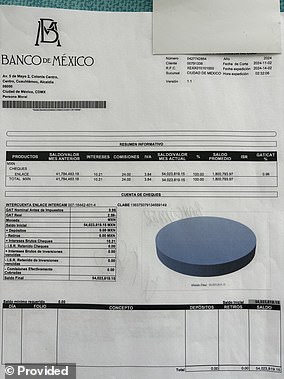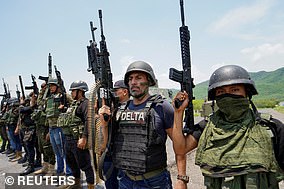When James, 76, got a call from a real estate agent in Atlanta, Georgia, offering to buy his timeshare, he could have bitten his hand off.
James and his wife Nicki, 72, had bought the property in Lake Tahoe, California, in the mid-1990s for just under $9,000, but have only stayed there twice in the past 20 years.
The agent made a slick presentation and a few days later called back with “good news”: He had found a Mexican investor willing to part with more than $22,000 for the West Coast retreat.
James and his wife Nicki wanted to get out of their timeshare in Lake Tahoe
About six months later, James and Nicki had lost nearly a million dollars as part of a bizarre but sophisticated scam allegedly linked to a deadly Mexican cartel.
James told DailyMail.com about that initial phone call, supposedly from a man named Michael from Worry Free Vacations in Atlanta in October 2022.
“He was good at ingratiating himself,” James said. “He had an air of confidence. I thought ‘this guy is legit.'”
In retrospect, he may have had a slight accent, possibly Mexican, James recalls, but it was barely noticeable at the time.
Michael had wealthy clients who wanted to invest in timeshares in the United States and James had four, including one in Lake Tahoe, that he wanted to get rid of.
A few days after James heard about the Mexican investor, Michael called again. “He had run into a little problem.”
A $2,600 fee was required for the cross-border transaction, but the buyer had promised to cover it.
James, who did not want to share his last name, admitted that his wife had concerns about this deal from the beginning.
But she was reassured when Michael told her the buyer would send the cash to US Commercial Escrow Corps, an escrow company registered in Manhattan.
James was given the details of the account and when he checked it, it appeared the $2,600 refund had been paid.

Scammers use fake bank statements that look authentic
He even contacted a representative from the escrow company, who spoke with an American accent.
Convinced of its legitimacy, he transferred the $2,600 to a bank account in Mexico, as requested.
But then the deal hit another snag. A different cross-border registration fee would cost another $3,600, but the buyer would again reimburse James for his troubles.
He checked the escrow account and, as before, the payment appeared to have been made.
“I felt good,” James said. “I thought, ‘I’m going to get reimbursed for this, everything’s going to be fine.'”
About a week later, Michael called again. And so it continued.
The total fee soon reached the $50,000 mark, at which point he was contacted by a man pretending to be from the UIF, Mexico’s financial intelligence unit.
He demanded higher fees for various violations James had allegedly committed, with threats of extradition if he did not comply.
Meanwhile, their costs were apparently reimbursed by the mysterious Mexican investor, who clearly had no limits to his wealth.
The money always appeared in the New York escrow account, but funds were never released.
The scammers even convinced James to invest $32,000 in a sustainable housing investment in Mexico.
He received documentation confirming the transaction that appeared to be from the Bank of Mexico, with detailed addresses and letterhead.
In total, James had to make a dozen payments for various reasons.
He made his last payment in January, totaling a whopping $890,000 spread across several bank accounts in Mexico.
Just under a third of this was related to their timeshare, with the remainder being commissions on investing in sustainable housing.

The gun-toting Jalisco Nueva Generación cartel is best known for drugs, but has also scammed timeshare owners in the United States out of millions of dollars in recent years.
To finance these payments, James had to borrow $150,000 from his daughter and sell his childhood home.
By the time he began to discover some worrying details, it was too late.
James discovered that the Atlanta real estate agency’s website had been registered in 2021, but was deleted just days after his first phone call from Michael.
The email address he had from a man claiming to be from Banco de Mexico, along with the domain names of other “Mexican” companies that had been involved in the scandal, appeared to have been registered in Arizona and, inexplicably, in Reykjavik.
“None of them had addresses or locations in Mexico,” James said.
When DailyMail.com visited US Commercial Escrow Corps’s address in midtown Manhattan, it appeared the suite number it had provided did not exist and no one in the building had heard of the company.
For James, the scam cost him his life savings and the respect of his wife.
“It was very elaborate,” he said. “That’s why I was fooled. I thought there were too many players involved for it to be a scam.”
‘My wife said from the beginning that it didn’t sound good. Obviously, she should have listened to her.
‘She’s pissed off about the whole thing. But she’s sort of resigned herself to the fact that I was the stupid one.


